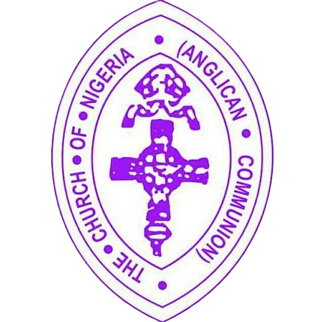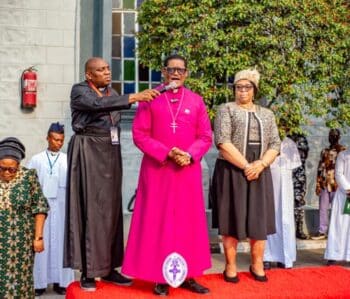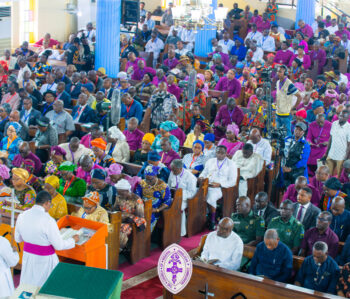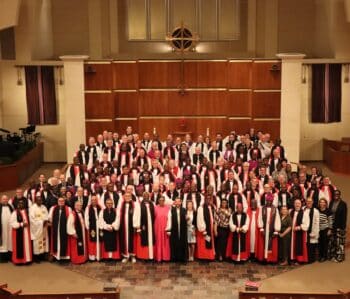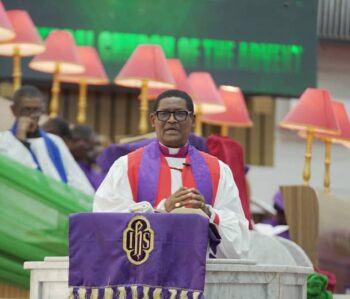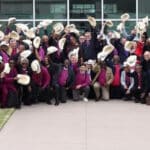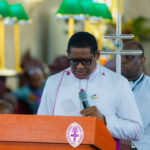- Korede Akintunde
- October 26, 2023
- 0 Comments
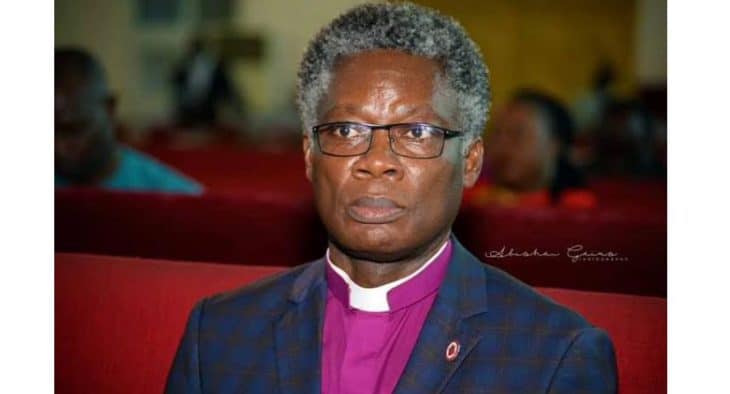
The Most Rev. Dr. Blessing C. Enyindah, DSSRS, JP, AP.
is the Dean, Church of Nigeria (Anglican Communion), Archbishop, Niger Delta Province and
Bishop, Diocese of Ikwerre. He delivered this Lecture at the 36th Convocation Ceremony of St. Francis of Assisi College, held in Wusasa, Zaria, Kaduna State on 26th October, 2023.
Preamble
I was amazed when at about 3.45p.m. on Wednesday, 27th September, the Acting Rector of this premier College, Venerable Alkali Titus contacted me by phone call, requesting that I come to deliver the 36th convocation lecture of the College, this year. My amazement was based on the fact that the call came when I was returning from Abeokuta, where a few hours ago, I had delivered the convocation lecture on the theme “Skill Acquisition, a must for Nigeria youth” at the graduation ceremony of Peter Akinola Foundation Youths Training Centre, Abeokuta. I did not hesitate to accept the invitation and told him to send me the details. I did not hesitate to accept the assignment for three reasons.
First, I feel that God wants to use me to pass a certain message to our nation and the church via this medium of convocation lectures, hence the invitations.
Second, I lead the coordinating team of the Church of Nigeria Senior Clergy Management. The acting Rector is an active member of the team who handles our Bible studies. I feel that my coming will afford me the opportunity to know where he comes from to Ibru Centre, Agbarha–Otor, Delta State whenever we are meeting and appreciate the sacrifice he makes.
The third reason is that it will afford me the opportunity to know this part of Nigeria and Wusasa in particular.
I am therefore delighted at the privilege of being asked by the authorities of the College to deliver this 36th convocation lecture of this great and premier Theological Seminary in the North of Nigeria. My sincere and deep gratitude to the Acting Rector, Ven. Alkali Titus for contacting me and all those who made our coming possible. We are grateful to the Rector who chatted us up from South Sudan.
I bring you greetings from my family, your brothers and sisters in the Diocese of Ikwerre and the Ecclesiastical Province of Niger Delta, Church of Nigeria (Anglican Communion). My family is in grieving and mourning mood right now. On Sunday, 15th October, 2023, we suddenly lost by death, my youngest brother (the last born of our parents) who was only 43 years, leaving behind a young widow and three kids. He will be laid to rest on Friday, 3rd November, 2023. May his soul rest in peace. I request that you pray for the family.
Introduction
Nigeria and other developing nations, no doubt, are grappling with obvious difficulties occasioned by bad leadership at all levels. Throughout her independence history, Nigeria has not been blessed with good leadership. This is worrisome especially considering the difficulties the citizens are going through as a consequence of bad leadership. Today, prices of goods and services have reached the roof tops and standards of living have fallen so low. There is perennial unemployment and those who are employed are painfully employed or under employed. People’s take – home – pay cannot take them home.
From the look of things, this nation appears to be at the brink of extinction. Security wise, our country is precarious.
Today, we are witnessing diverse security challenges occasioned by the orgy of violence, kidnapping, sporadic and indiscriminate shootings, religious jingoism, ethnic sensitivities and so on. There is widespread criminality, banditry and brigandage. The quantum of losses incurred by Nigerians in terms of lives and property exceed the power of computation. This has given rise to an imperiled future for many Nigerians. The major cause of all these is leadership that is devoid of integrity. When we bring in integrity to governance at all levels and in all spheres of life whether in the ecclesia, academia or government, we will birth a new nation where there shall be economic prosperity and national development. This paper, therefore, recommends biblical integrity as a panacea to Nigeria’s numerous leadership problems.
Leadership style and governance pattern in Nigeria has been the bane of Nigeria’s socio – economic development. Nigeria appears to be like a rudderless ship navigating the stormy wind in the comity of nations. All through her independence history, Nigeria has got leaders who rode to power and affluence on the crest of looted funds. Self – aggrandizement and primitive accumulation are commonplace. Today, we have leaders who live in castles while majority of the citizenry live in roofless hovels. We have leaders whose pets, including lions, feed fat but their followers live in abject poverty and squalor. We have corrupt leaders at all levels. At the federal, state and local government levels of leadership and governance, we have corruption in full swing. At the community levels we see those involved in community development syphon community funds from time to time. Even in the ecclesia, we also have corrupt practices going on at the various leadership levels.
Like the proverbial horse leach which cries for more, our leaders are never satisfied with their loots. Hence, they continue to syphon the national treasury even when they have no need of the loots. They have cars they do not use, houses they never live in and money they cannot exhaust up to the fifth generation of their family. The loots of the Late General Sani Abacha were mind boggling. His loot was discovered because he died in office. If he had successfully completed his tenure of office, no one would have heard of his loots. Unfortunately, it appears the loot was looted. Observing Nigeria over a period of time, the Legend, Chinua Achebe of blessed memory asserted that the trouble with Nigeria is simply and squarely a failure of leadership (Chinua Achebe, 1983).
The ugly situation is even made worse by the followers. How? We may ask. When a man is given a political office, his kinsmen quickly send delegations to him. One of the things they say is, “This is our turn. So, utilize it very well.” And what they mean by that is simply, “Steal as much as you can.” The followers also add to the problem when they expect the politicians to give them money all the time. Though, this could be because the followers are aware that their leaders are stealing their commonwealth and spending it on lavish and prodigal lifestyle and, therefore, collecting from them may be a way of taking back part of the national cake from these opulent politicians. But there is another problem. It is the problem of social orientation and values. Our society values affluence so much. This is why when people serve selflessly and honestly in government and retire to their homes without fleet of cars and sky scrapers, they are despised by their people. When they cannot make donations of whooping sums of money because they did not steal public funds, they are booed and jeered by their kinsmen. But the man who stumbled into public funds and syphoned them with recklessness is celebrated. In Nigeria, we honour major thieves and hang minor ones. Unfortunately, stealing and looting has become a cherished norm because you get what you reward. Our society is rewarding corruption and we are getting more leaders who are corrupt.
But who is a leader and what is leadership? In the section that follows, we shall attempt a conceptual analysis of the key words in our subject of discourse. Let us begin with the term “Leader.” A leader, according to Oxford Learner’s Dictionary is one who leads, commands a group, an organization or a country.
He is the principal player in music group. Similarly, the Cambridge online Dictionary defines a leader as one who is in control of a group, country or situation. What all these definitions point to is that a leader is one who is saddled with the responsibility of directing and coordinating the affairs of a people, group or organizations or nation for the attainment of group, organizational or national goals and objectives. Further, Kraus (2005) defines leadership as the process by which one person influences another to accomplish a mission, an objective or a task. Similarly, Schein (1980) defines leadership as a function of the relationship between the leader, the followers, and task situational characteristics. For O’ Donnell and Weihirch (1980), leadership is the art of influencing people so that they will willingly move towards the achievement of group goals.
Finally, Leadership expert, John Maxwell, defines leadership simply as influence. The import of this second category of definition of leadership is its emphasis on influence which is largely a product of integrity. We shall then turn our attention to integrity which is the next concept that is of importance in this discourse. The word integrity means the quality of being honest and having strong moral principles. It is also the state of being whole and undivided, upholding territorial integrity or national sovereignty. A leader with integrity, therefore, does the right thing at the right time and for the right reasons. The importance of integrity in leadership led Norman Schwarzkopf (2016) to assert that “Leadership is a potent combination of strategy and character. But if you must be without one, be without strategy.”
This position underscores the value placed on integrity in leadership because we know that there is no way leadership can be without strategy. But when it comes to the order of preference, Schwarzkopf maintains that character or integrity comes first.
It is pertinent at this juncture to examine leadership integrity and what it entails.
Leadership Integrity: The Pros and the Cons
There are various ways to know when a particular leader or leadership has integrity. Like Christ said, “By their fruits, you shall know them.” One of the ways to identify leadership with integrity is if the leader has the fear of God. God spoke through David with a strong hand and said, “…He that rules over men must be just, ruling in the fear of God” (2 Sam. 23:3). This is not the sugar – coated fear of God claimed by most leaders. This is the fear of God that is anchored on the recognition of the greatness of God who can teach people terrible lessons in righteousness, and therefore, leads to obedience to His commands. This kind of the fear of God shows in what we do. Proverbs said the fear of God is to hate evil; the froward tongue, pride and the evil way (Prov. 8:13). From this passage, it is clear that one cannot claim to fear God and still be involved in evil ways. Let us consider one glaring example. In the encounter between Abraham and Abimelech, Abraham said, “Because I thought, surely the fear of God is not in this place; and they will slay me for my wife’s sake” (Gen. 20:11). So, what people do is an indication of whether or not they fear God. For instance, a leader who would kill to acquire power does not have the fear of God. A leader who will gossip, maim, witch hunt and deceive to attain does not have the fear of God. A leader who will live in castles while the rest of Nigerians are dying in hunger does not have the fear of God. A leader who would inflate contract values for self – enrichment at the expense of the future of Nigerians does not have the fear of God.
Another important characteristic of leadership integrity is acting right.
The passage we cited earlier in 2 Samuel said, “He that must rule over men must be just…” (2 Sam. 23:3). Consider the use the word “Must.” This implies that acting right is a necessary condition for leadership whether in the Church or in the government. As we said earlier, leadership integrity means doing the right thing at the right time and for the right reasons. Nigeria would be a better place when everybody decides to act right. What actually is the meaning of righteousness? It is simply doing the right thing. If the legislature decides to do the right thing through good legislations, our country will be better. If the judiciary decides to let justice run down like mighty waters, those who want to transgress the law would be deterred. If the executive implements policies that are intended to ameliorate the pains of Nigerians, this country would be a haven for all of us. If the Archbishop, bishop and clergy decide to pastor well and do the right things, there would be positive transformations. So, we must rise up from this convocation lecture and decide to act right where ever we are.
Further, leadership integrity is one that is accountable and transparent. From the way some leaders act you will know that they feel that they are not accountable to the people. They do things any how and reject coming to give account of their stewardship. They forget that leadership is stewardship. A leader who has integrity will always give account of his activities. A leader who has integrity knows that he would give account to both man and God and would not want to be found wanting. He would do everything possible to serve his people in the will of God. Such leaders would say what they mean and mean what they say. Their word would be their bond. But this is lacking in most leaders today. We have leaders who make promises they don’t intend to fulfill. They just speak to shore up support and win election. But to fulfil electoral promises is far from their mind. This is a clear sign of leadership devoid of character.
Again, a leader who has integrity is selfless. When a person becomes a leader, he loses the right to think about himself. But this is not the case with the types of leaders we have both in the secular and in the ecclesia. In Nigeria, the moment a person becomes a leader, the first thing he or she thinks about is his or her family. But leadership integrity imitates Christ who left the glory and majesty of heaven and became associates of fallen men; who took upon him the form of a servant and who came to serve, rather than being served (Mark 10:44 – 45). Leadership integrity produces servant – leaders like Christ.
Leadership Devoid of Integrity: Dimensions and Consequences.
When a leader lacks integrity, the situation becomes very difficult and bad for the led and even for himself. Several years ago, Prof. Mark Anikpo said, “In Nigeria, the poor do not sleep at night because they are hungry. Similarly, the rich do not also sleep at night because the poor are awake.” The implication is that nobody, both the rich and the poor sleep well at night. Leadership that is devoid of integrity is the reason we are where we are today. We cannot even attract foreign investors which would have increased the level of employment. We cannot also attract tourists to our country because of insecurity and instability gendered by bad leadership. Achebe paints the ugly picture of the Nigerian state which would make it difficult to attract tourists in unequivocal and distasteful terms. He said:
Nigeria is one of the most disorderly nations of the world….it is a measure of self – delusion that we can talk about developing tourism in Nigeria. Only a masochist with an exuberant taste for self – violence would pick Nigeria for a holiday; only a character out of Tutuola seeking to know punishment and poverty at first hand! No, Nigeria may be a paradise for adventurers and pirates, but not for tourists (Achebe, 1983:11).
This says it all. Achebe further argues that anyone who does not see this country as alarming is either a fool, a crook or does not live in this country. But the situation was not as worse in the days of Achebe as it is today. If Achebe were writing in contemporary Nigeria, he probably would have painted more horrible and terrible pictures of the situation than he did several years back.
Also, when a leader lacks integrity, there would be suspicion of all kinds. You know that nobody believes most of our leaders even when they have good policies. Yes. This is due to the way they have deceived the populace in the past. Today, INEC would say one thing and tomorrow they would say a different thing. We have leaders who speak from both sides of their mouth and this has eroded public confidence. The various lies that clergymen tell in their parishes have made the congregation lose confidence in their clergymen. And when trust is lost, it becomes difficult to lead or manage the people. Not much can be achieved in a place where everybody is suspicious of the other person. There is no gain saying the fact that leadership without integrity erodes public confidence.
Further, leadership without integrity has created degrading and dehumanizing poverty through the primitive accumulation of wealth by the ruling class. The scripture says “Moreover the profit of the earth is for all…” (Eccl. 5:9). But a few people have taken possession of what belongs to the entire populace. The result is the alarming degree of poverty, suffering, hunger and so on in the land. This has predisposed the youths to all manner of vices including internet fraud. Nigeria has both human and material resources to compete favorably in the comity of nations. Nigeria has every resource that would make it a great nation. All it lacks is good leadership that would manage the resources for the good of all.
Leadership Integrity in a Perverse and Morally challenging time: The Way forward
By now you should know that Nigeria is an inverted society. What we mean here is that other people’s normal is our abnormal and vice versa. That is, what is reprehensible in decent cultures are celebrated in Nigeria. What is detested and treated as scum in advanced societies is promoted in Nigeria. Nigeria, no doubt, is an inverted society where majority people do the wrong thing. Have you taken time to consider why the same Nigerians who behave as if transgression is constitutional behave well outside the shores of our country? Maybe, you have not. But you should. The problem is that majority persons are doing the wrong thing and the judiciary that should have checked these wrong doers is prostrate. When majority people are doing the wrong thing, then doing the right thing becomes challenging. Those who want to do the right thing in Nigeria are jeered at and regarded as naïve. In Nigeria, to serve in public office without stealing money is seen as abnormal whereas stealing public funds is seen as normal.
Ladies and gentlemen, I wouldn’t tell you that it would be easy to do the right thing in Nigeria; for as Isaiah puts it, “And judgment is turned away backward, and justice stands afar off: for truth is fallen in the streets, and equity cannot enter. Yes, truth fails; and anyone that departs from evil makes himself a prey…” (Isai. 59:14-15). Anyone who departs from evil makes himself a prey. So, it won’t be an easy task. There would be conspiracy against you like was done against Daniel. If you want to run for public office, they may not even give you the opportunity to win. Those who win elections are like them. But we have to stand up for what is right. This is why we are a Church.
Paul admonished us to do so. He said, “That you may be blameless and harmless, the sons of God without fault, in the midst of a crooked and perverse nation, among whom you shine as lights in the world” (Phil. 2:15). Also, God commanded us not to follow the multitude to do wrong or to wrest judgment (Exo. 23:2). We have to shine as light in the world of sin. We have to distinguish ourselves from the crowd by doing the right thing. Let us now consider how we can foster leadership integrity in a morally bankrupt world.
First, the Church would take the lead in this clamour for moral revival in leadership. This is because what the church does matters so much. The Church is the ground and pillar of truth. The Church, in the words of Martin Luther King Junior (2013), “Must be reminded that it is not the master or servant of the State, but rather the conscience of the State.” The Church is the conscience of the State because of its preoccupation with and emphasis on the ethos of human life and existence. And ethical development is an important aspect of national development. When the church acts as the conscience of the State, then the State would be cautious of what it does. Whatever happens in the Church tugs at the foundation of civil government. The Church, therefore, should begin to do things right. This would trickle down to the society. But when the Church, the foundation of morality, is compromised and made a toothless bulldog, what can the people do? When the Church is involved in all kinds of vices and manipulations, then there is no hope for our nation. The church must be the light of the world and the salt of the earth (Matt. 5:13-14).
The ugly situation in our country is compounded by the faith movement or the prosperity gospel syndrome. The faith movement with its teachings on the ontological equality between man and God through faith (Charles Mathewes, Ed. 2007) and the “sow seed” syndrome to activate the said equality, has created a materialistic society. Max Weber, in his book, The Protestant Ethic and the Spirit of Capitalism, remarked that capitalism is the unanticipated consequence of Protestantism (Weber 2003). In the same vein, increased corruption is the inadvertent consequence of the prosperity gospel. No doubt, the sow seed syndrome has created a wealthy class of religious leaders on one hand and an overwhelmingly number of impoverished votaries on the other hand. Let us take a typical example. An applicant meets a man of God for prayers to get a job and the man of God tells him to sow seed. When an applicant who is seeking employment is asked to sow seed to the man of God before he can get a job, it is nothing but a clear case of exploitation of the poor by the rich and wealthy religious class. Also, when a widow who is living on a miserable pittance or zero income level and who goes to the priest to seek divine help is asked to sow seed, then we see sufficient display of mindless oppression.
Second, there must be emphasis on moral education because “to educate a man in mind and not in morals,” as Theodore Roosevelt opined, “is to educate a menace to the society.” An educated immoral person becomes a nuisance to the society and an intelligent thief. We must lay this foundation of moral education on God’s word and not on human ideology. The conquest of the human will be too powerful for ideology; for only the Son of man can set free from sin and its power.
Third, theological institutions and secular Universities and Colleges must learn to do right. The universities are a miniature representation of the larger society. If the lecturers in the universities and colleges decide to act right, it would go a long way to influence their students who would be leaders of tomorrow. But where lecturers take bribes and sleep with female or even male students to award grades, then we are plunging deeper into the pit. The implication is that these students graduate tomorrow and begin to recoup whatever they spent from any means available to them. Our teaching and non – teaching staff must be icons of morality if we are going to birth a new and great Nigeria. The drug expert Forest Tenant said, “You can teach Children what you know but you will only reproduce what you are.” This is breath – taking.
Fourth, we have tolearn the ants’ principle of the common good. This principle emphasizes the need for common interest, promotes the adequate management of resources for the good of all rather than to satisfy the greed of selfish leaders. The principle prioritizes the well – being of all in spite of gender, ethnicity, religious inclinations or political ideology and affiliation (Asouzu, 2007). This principle realizes that “wealth” as Martin Luther King Jr. (2013) said, “Is as a result of the common wealth” and so should be distributed for the good of all. It takes integrity to ensure that resources are distributed for the good of all. This is because a leader who would distribute resources accordingly has already made up his mind to have less.
Another thing we learn from the ant is making provisions for the future contrary to the selfish ideologies of our leaders. The selfish ideology dominant among Nigerian leaders has no long – term plan for the development of Nigeria. It seeks to acquire whatever it can at the moment without recourse to what happens to our collective future. But with its ideology of future referentiality, leadership integrity advocates the need to make provisions for sustainable development in the future. The operation of the ant is narrated fully in the Biblical book of Proverbs where it was observed that the ants gather their food in the summer for future use by the family (Proverbs 6:6-8). So, the ants make adequate plan for their collective well – being. By implication, the philosophy condemns excessive borrowing which is used to finance the greed of some leaders. In the light of this understanding, this leadership ideology from the ant would help to eliminate the undue burden from debt servicing on the future generation.
Finally, we have to birth a leadership pattern that is devoid of ethnicity and religious exclusivity. That is, irrespective of people’s religion or ethnic group, they exist to serve a missing link of ontological reality. They have a role to play in existence because existence is like a system in which individual parts contribute to the functioning of the whole. In this wise, there is a rejection of religious bigotry or particularism or ethnic preferences. In other words, the philosophy rejects judging people in the context of their tribes but in the content of their character. The truth is that we need people from all tribes to work together to savage Nigeria from this brink of collapse. This leadership philosophy follows the recommendations of Paul that there is no difference between the Jew and the Greek: for the same Lord over all is rich upon all that call on Him (Rom. 10:12).
Conclusion
We have examined the ugly state of the Nigerian nation occasioned by bad leadership with the collaboration of the citizenry and the church. We have seen that Nigeria is going down the drain rapidly because every measurement of national development is declining at an alarming rate. We have also seen that leadership failure can be implicated for the ailing nature of our country. We have seen that this leadership failure is due to the selfish interest which has overridden general interest among our leaders both in the sacred and in the secular institutions. And this has created all kinds of disenchantment in people over the Nigerian project. This has also destroyed mutual trust between leaders and the led and between the citizens along ethnic lines and religious inclinations.
This lack of trust has brought about secessionist movements, disaffection, bifurcation, segmentation and polarization. We have seen that the ants work for their common good and plan for their future together. In the same way, nothing would be impossible in our bid to develop a Nigeria of our dream, if we work as a team, consider general interest above personal interest, see every one as an inseparable part of an ontological reality and make adequate plans for future generation. We have seen the need for religious tolerance, morality of leaders, selfless service and commitment to general interest which are the preoccupations of religious studies and which are, nonetheless, essential for national development.
Finally, we have seen that the Judeo – Christian tradition where we all belong and practice abhors greed. Our Christ, said, “Beware of covetousness: for a man’s life does not consist in the abundance of things he has” (Luke 12:15). In fact, the Preacher after acquiring everything he could in life concluded, “All is Vanity of vanities” (Eccl. 12:8). So, when we have religious, traditional and political leaders who are greedy and corrupt, it is simply and squarely a contradiction of the basic teachings and tenets of our Christian faith. When we have leaders who don’t want to act right, they are a strangers to the covenant of promise because God has instructed us to always do the right thing even when nobody is watching. This is integrity and it is imperative for national development; for it is required of stewards that a man be found faithful.
References
Achebe, Chinua (1983). The Trouble with Nigeria. Enugu, Fourth Dimension.
Asouzu, I. (2007). Ibuanyidanda: New Complementary Ontology Beyond World – Immanetism, Ethnocentric Reduction and Impositions. USA: Transaction Publishers.
Cambridge online Dictionary
Gregor Mac. (2007). The Word – Faith Movement. In Charles Mathewes. Journal of the American Academy of Religion, volume (75)1.
Kraus, J. (2005). Leaders Born or Made? Senor Corporate Trainer Aflac Corporate Training and Dev.Ikraus@aflac.com.
Luther, M. K. Jr. (2013). Strength to Love. Benin: Religious Broadcasting Publishers.
O’ Donnell and Weihrich (1980). Management: A Book of Readings. New York: Mc Graw – Hill
Oxford Learner’s online Dictionary, Schein, E.H. (1980). Organizational Psychology: Foundations of Modern Psychology. New York: Prentice Hall Schwarzkopf N. (2016). Http//: www.inc. james-kerr
The King James Bible.
Weber, M. (2003). The Protestant Ethic and the Spirit of Capitalism. USA: Dover Publications.
